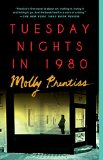Summary | Excerpt | Reviews | Beyond the book | Read-Alikes | Genres & Themes | Author Bio

Is the path you're on now truly where you wanted to be at this station in life? Do you look back and wonder about the road not taken? These important questions weigh us down occasionally, but raising them is worth the effort as it helps us take stock and recalibrate our goals.
Forty Rooms is rooted in just this kind of emotional minefield. It is a deeply introspective novel that explores the meaning of a life well lived, and one that teases out the razor-thin line between happiness and contentment. This brand of existential angst might have served as fodder for many a story before this fine one, but Grushin's book goes beyond the derivative. In a particularly impressive fashion, her novel presents one young girl's journey from her parents' home in Russia to that of a housewife in the United States as a series of vignettes in forty different rooms. For example, it is in a dacha bedroom, when she is talking to a close friend, that the unnamed narrator is convinced that what she does not want "is a small life, a life of mundane concerns."
The protagonist, a daughter of Russian intelligentsia, harbors dreams of becoming a poet, following in the footsteps of literary giants of the past. She moves to the United States to pursue graduate school, refusing to answer every stupid question directed at her about Russia, falls in and out of love, writes forgettable poems (and a few memorable ones), and then makes the mistake of giving in to marriage. While this need not necessarily stifle anybody's dreams, the narrator finds herself falling into neatly laid out roles, struggling with the smothering of her ambitions while also finding a guiltily satisfying release: "It's an absolute despair and at the same time a kind of sweet relief," Grushin writes, "to give up worrying about achievements for a spell and surrender to the inevitability of her temporary escape from destiny."
As the narrator moves from married woman to the mother of six children, she struggles to find her identity even in the most banal things, such as the daily wash for example:
There was a young woman from Moscow
Who bought laundry detergent at Costco.
But her clothes turn to mold,
And then she grew old,
That no-longer-young woman from Moscow.
It's this gradual evolution – the giving up of dreams – that is superbly captured in its seamlessness. The narrator's growth from a bright ambitious girl to the entirely dependent, yet seemingly content Mrs. Caldwell, the use of just the last name underscoring that her identity is now derived only through a husband, is moving and resonant. Mrs. Caldwell's endless navel-gazing might get tiring occasionally, but her experiences are valuable in their timelessness and universality, applicable to both women and men.
Grushin's prose is full of musings that read like poetry, and the novel is, in fact, peppered with poems that linger, including this one from the Russian poet, Innokenty Annensky:
Do you not imagine sometimes,
When dusk wanders through the house,
That here, alongside us, lies another plane,
Where we lead entirely different lives?
Back in the dacha bedroom, as a young girl, Mrs. Caldwell had made it clear that she didn't want "a life within four walls." The irony that her life story eventually ends up being defined within the confines of a series of such rooms will not be lost on the reader. Forty Rooms, an excellent choice for book clubs, succeeds movingly in its exploration of identity, contentment and marriage; of the choices we make and the compromises we learn to live with, that collectively make even the quotidian extraordinary.
Mrs. Caldwell eventually finds happiness in the everyday, and who can really tell whether this achievement is commendable or, as her friend scathingly puts it, a real failure of imagination. After all there's nothing quite like the patina of age to lend a life some much-needed perspective. The view from the other side might be more tempered, but breathtaking just the same.
![]() This review
first ran in the March 16, 2016
issue of BookBrowse Recommends.
This review
first ran in the March 16, 2016
issue of BookBrowse Recommends.

If you liked Forty Rooms, try these:

by Molly Prentiss
Published 2017
An intoxicating and transcendent debut novel that follows a critic, an artist, and their shared muse as they find their way - and ultimately collide - amid the ever-evolving New York City art scene of the 1980s.

by Nickolas Butler
Published 2015
Seldom has the American heartland been so richly and accurately portrayed. A rare work of fiction that evokes a specific time and place yet movingly describes the universal human condition - a novel that once read will never be forgotten.
Your guide toexceptional books
BookBrowse seeks out and recommends the best in contemporary fiction and nonfiction—books that not only engage and entertain but also deepen our understanding of ourselves and the world around us.